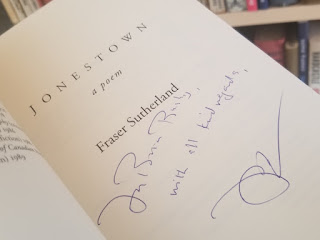Charles Grant Blairfindie Allen departed this mortal coil 125 year ago today, rising a metre then stepping aside at his home in Hindhead, Haslemere, Surrey. He wrote many of the very best novels in nineteenth-century Canadian literature. Were I to make a list of the top ten titles, Allen would dominate. That he also wrote some of the very worst is a mystery easily solved. Like fellow Ontarian Arthur Stringer, Allen looked to make a good living from his writing. For every British Barbarians (1895) there is A Splendid Sin (1899).
If you've not seen Allen's Hindhead, Haslemere home, here it is:
Allen's early writing dealt primarily with with science and nature Physiological Esthetics (1877) was his first book. The Colour-Sense: Its Origin and Development (1879), Evolutionist at Large (1881), Vignettes from Nature (1881), The Colours of Flowers (1882), Colin Clout's Calendar (1883), and Flowers and Their Pedigrees (1883) followed. Credit goes to publisher Andrew Chatto for suggesting the author try his hand at novel writing. Allen's first attempt, Philistia (1884), is well worth a read, but I recommend beginning with The Devil's Die (1888). After that, move on to The Woman Who Did (1895), his most notorious novel. Those drawn to black comedy will enjoy For Maimie's Sake (1886) and Michael's Crag (1893).
Our fears for Grant Allen were too true. He is dead. He died on Wednesday, the 24th, after a long and painful and obscure illness, to which the doctors are still unable to give a name, England thus loses a rarer sprit than she had yet realized the possession of.
Le Gallienne continues:
England is apt to take some time in recognition of its rarer spirits, She throughly stones them first, to try their mettle, and then when they are happily beyond hearing of their funeral orations – usually spoken by respectable gentlemen fit to provoke the dead to disturb with kindly laughter their own obsequies – she grudgingly erects bad statues in their honour. It is comforting at least to think that it is a long while yet before a statue is erected to Grant Allen. It took nearly a hundred years for men to think of a statue to Shelley.
 |
Charles Grant Blairfindie Allen 24 February 1848, Wolfe Island, Canada West - 25 October 1899, Hindhead, Haslemere, Surrey RIP |


















